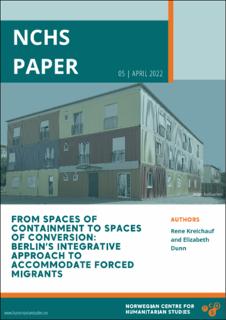From spaces of containment to spaces of conversion
Research report
Permanent lenke
https://hdl.handle.net/11250/2991388Utgivelsesdato
2022-04-01Metadata
Vis full innførselSamlinger
- Publications [1482]
Originalversjon
Norwegian Centre for Humanitarian StudiesSammendrag
In recent years, there has been extensive literature on the question of camps of all kinds, and the ways that the logic of encampment is spreading to other sites. Indeed, as more and more refugees settle in cities where they have widely different relationships to aid providers, the question of how the boundary between camp and city has become blurred has become central to the literature on refugee studies. In this paper, however, we argue that the distinction between camp and city is no longer a distinction that is useful in understanding different modes of governance, discipline, or care. Instead, we argue that new forms of housing, governance, and sovereignty have emerged from complex negotiations between cities, nation-states, aid providers, and refugees. Here, using the example of Berlin’s MUFs, we argue that the result of these negotiations, this humanitarian diplomacy, is a new form of refugee management and discipline that we call “sheltering,” that groups refugees with the urban poor and holds them in a permanently marginal position in urban society rather than either fully excluding or integrating them.
